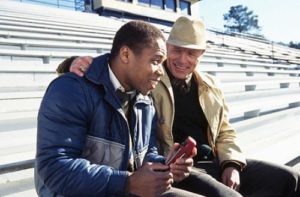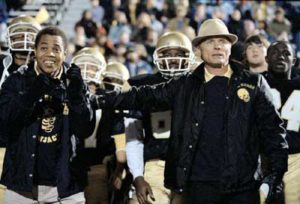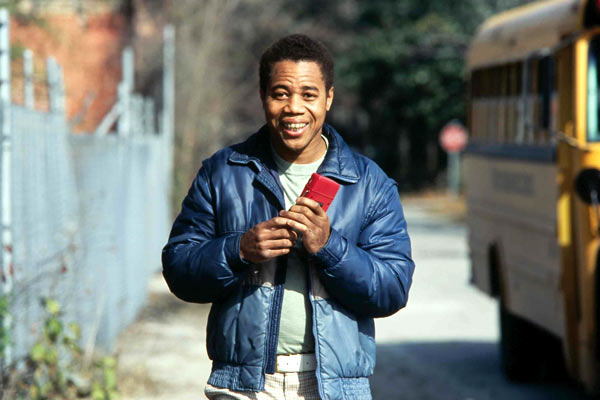Ed Harris and Cuba Gooding Jr. star in “Radio,” a film about a man with a developmental disability who somehow finds peace in the company of a high school football team. The film’s events are also inspired by a true story, particularly a Sports Illustrated article by Gary Smith entitled “Someone to Lean On.” Parts of the film even include footage of the real young man, nicknamed Radio, and its real coach, Harold Jones, toward the film’s conclusion. But ultimately what we have here is a feel good movie – not one of cheese or false sentiment – but a simple and pleasing film that is both a sports movie and a poignant drama, and refuses to sacrifice one for the other.
Radio is a complex character, and is played superbly here by Cuba Gooding Jr. Those familiar with Gooding Jr.’s work, especially the high energy “Jerry McGuire,” will find surprise in his role of the developmentally delayed Radio. He’s not over the top, or cute, or attention seeking. Radio is a young man who wanders around town pushing a shopping cart with a few necessities and a radio, who asks nothing of anyone but acceptance. He likes to hang around the football practices, on the other side of the fence, just watching.
He’s introduced to coach Harold Jones (Ed Harris), after a incident in which a group of football players at the Hanna High School play a mean prank on the Radio which terrifies the young man and infuriates Coach Jones. But thus begins a connection between Radio and the coach, a connection that would link them forever (even if it sometimes takes Jones away from his own family in the process).
 “Radio” is a seamless movie, one that never drags, and pulls audiences along with it willingly. Jones, at the film’s beginning, is a simple character you might expect to find in a small town like this. He begins every year by devouring old football tapes, running plays in his head, and, regrettably, often shunning family in his quest for the holy win. “That’s the first ‘I’ll be right up’ of the season,” his wife jokes one night.
“Radio” is a seamless movie, one that never drags, and pulls audiences along with it willingly. Jones, at the film’s beginning, is a simple character you might expect to find in a small town like this. He begins every year by devouring old football tapes, running plays in his head, and, regrettably, often shunning family in his quest for the holy win. “That’s the first ‘I’ll be right up’ of the season,” his wife jokes one night.
Jones – like many people of Hanna, S.C., changes because of Radio. Of course Radio is not his real name – that is James Robert Kennedy. Radio begins to hand around the football practices and games, is eventually accepted by the team, and begins to teach them something along the way about life. Since this is a small town, there are of course repercussions, with several of the townsfolk question the coach’s decision to bring the developmentally disabled boy under his wing.
Many conversations – about football, wins, losses, and, about Radio – take place in the local barbershop. Coach Jones stops in for a cup of fresh coffee and dishes out the week’s news. It’s as small town as you can get, and these feel like real people, not merely caricatures for a movie.
The strength of “Radio” lies in its acting, and its straightforward aim. Harris puts forth a wonderful performance as Coach Jones, becoming at once a teacher, athletic director, coach, and father to Radio that he never had. In films like “A Beautiful Mind” or “Enemy At The Gates,” Harris has a semi prickly demeanor, required by the role. But here we are brought a fresh, energetic, and caring Harris, mirroring acting chops and character dynamism I haven’t seen since 1992’s “Glengarry Glen Ross.”
 Alongside him, Gooding Jr. is just amazing, who completely disappears into the role of Radio. It’s no surprise that Gooding Jr. won an Image Award for Outstanding Actor in a Motion Picture for his portrayal here. Special mention should be given to some other players, such as Alfre Woodard, who plays Hanna’s High School Principal, Brent Sexton who plays Assistant Coach Honeycutt, S. Epatha Merkerson, who plays Radio’s mother, and Debra Winger who plays Jones’ wife Linda. All add to the film in pleasing ways throughout.
Alongside him, Gooding Jr. is just amazing, who completely disappears into the role of Radio. It’s no surprise that Gooding Jr. won an Image Award for Outstanding Actor in a Motion Picture for his portrayal here. Special mention should be given to some other players, such as Alfre Woodard, who plays Hanna’s High School Principal, Brent Sexton who plays Assistant Coach Honeycutt, S. Epatha Merkerson, who plays Radio’s mother, and Debra Winger who plays Jones’ wife Linda. All add to the film in pleasing ways throughout.
At the end of the day, “Radio” is both an inspirational film and a sports film. There are places that are tough to get through, but overall the movie is tight and focused. It builds its small town culture well, gives its characters the depth they deserve, and ends in a positive place that shies away from convention. If you’re expecting Radio to charge the field’s as one of Hanna’s own, as in the powerful “Rudy,” this isn’t the movie for you. This is a film about acceptance, redemption, and love. If that’s enough for you, give “Radio” a try. You won’t be disappointed.
– by Mark Ziobro


